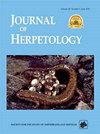尼罗河监测器分布模型助力地区减灾工作
IF 0.8
4区 生物学
Q3 ZOOLOGY
引用次数: 0
摘要
本文章由计算机程序翻译,如有差异,请以英文原文为准。
Nile Monitor Distribution Models to Aid Regional Mitigation Efforts
求助全文
通过发布文献求助,成功后即可免费获取论文全文。
去求助
来源期刊

Journal of Herpetology
生物-动物学
CiteScore
1.60
自引率
0.00%
发文量
45
审稿时长
6 months
期刊介绍:
The Journal of Herpetology accepts manuscripts on all aspects on the biology of amphibians and reptiles including their behavior, conservation, ecology, morphology, physiology, and systematics, as well as herpetological education. We encourage authors to submit manuscripts that are data-driven and rigorous tests of hypotheses, or provide thorough descriptions of novel taxa (living or fossil). Topics may address theoretical issues in a thoughtful, quantitative way. Reviews and policy papers that provide new insight on the herpetological sciences are also welcome, but they must be more than simple literature reviews. These papers must have a central focus that propose a new argument for understanding a concept or a new approach for answering a question or solving a problem. Focus sections that combine papers on related topics are normally determined by the Editors. Publication in the Long-Term Perspectives section is by invitation only. Papers on captive breeding, new techniques or sampling methods, anecdotal or isolated natural history observations, geographic range extensions, and essays should be submitted to our sister journal, Herpetological Review.
 求助内容:
求助内容: 应助结果提醒方式:
应助结果提醒方式:


